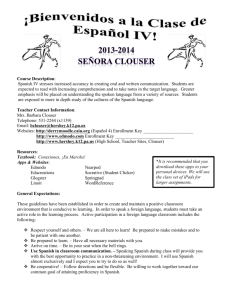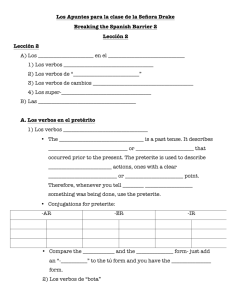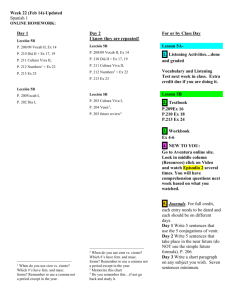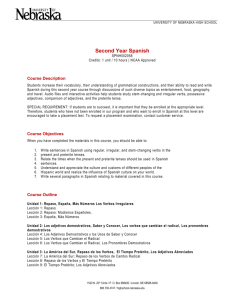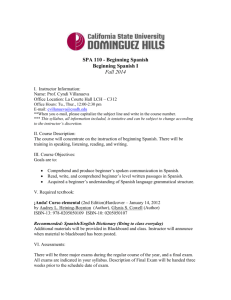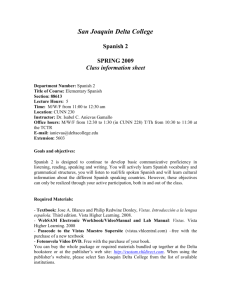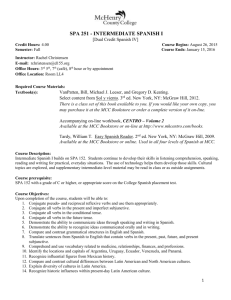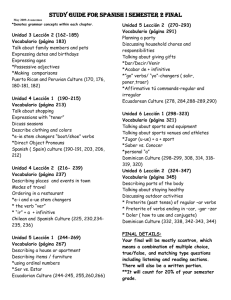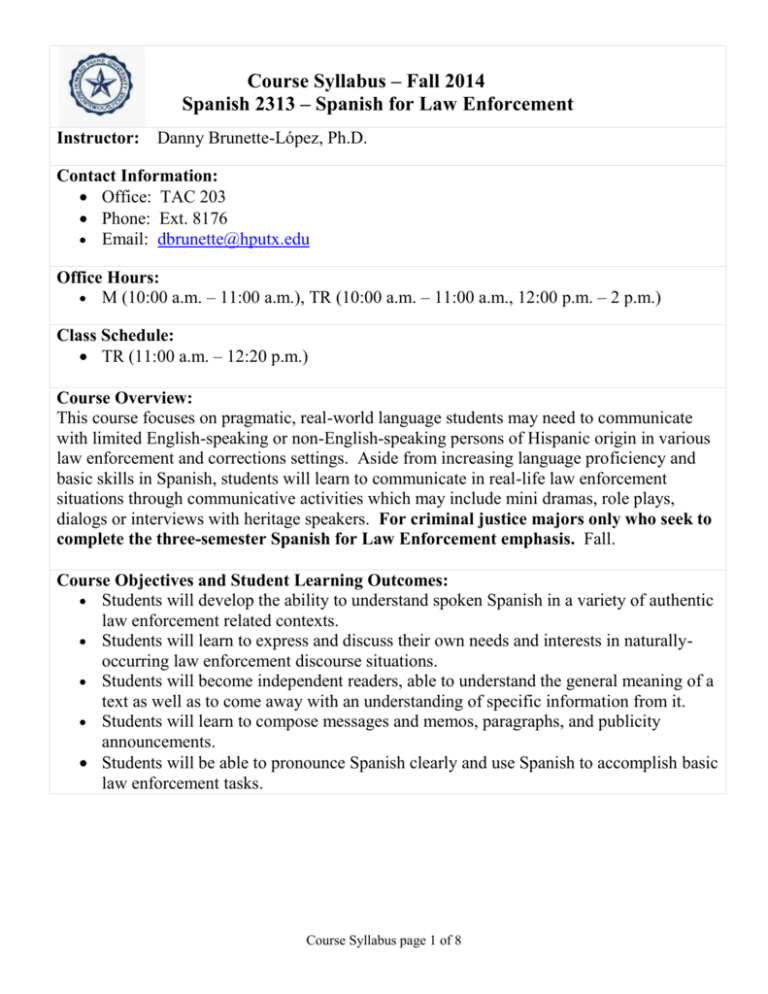
Course Syllabus – Fall 2014
Spanish 2313 – Spanish for Law Enforcement
Instructor: Danny Brunette-López, Ph.D.
Contact Information:
Office: TAC 203
Phone: Ext. 8176
Email: dbrunette@hputx.edu
Office Hours:
M (10:00 a.m. – 11:00 a.m.), TR (10:00 a.m. – 11:00 a.m., 12:00 p.m. – 2 p.m.)
Class Schedule:
TR (11:00 a.m. – 12:20 p.m.)
Course Overview:
This course focuses on pragmatic, real-world language students may need to communicate
with limited English-speaking or non-English-speaking persons of Hispanic origin in various
law enforcement and corrections settings. Aside from increasing language proficiency and
basic skills in Spanish, students will learn to communicate in real-life law enforcement
situations through communicative activities which may include mini dramas, role plays,
dialogs or interviews with heritage speakers. For criminal justice majors only who seek to
complete the three-semester Spanish for Law Enforcement emphasis. Fall.
Course Objectives and Student Learning Outcomes:
Students will develop the ability to understand spoken Spanish in a variety of authentic
law enforcement related contexts.
Students will learn to express and discuss their own needs and interests in naturallyoccurring law enforcement discourse situations.
Students will become independent readers, able to understand the general meaning of a
text as well as to come away with an understanding of specific information from it.
Students will learn to compose messages and memos, paragraphs, and publicity
announcements.
Students will be able to pronounce Spanish clearly and use Spanish to accomplish basic
law enforcement tasks.
Course Syllabus page 1 of 8
Required Course Materials:
Rush, Patricia and Patricia Houston. Spanish for Law Enforcement. Upper Saddle
River: Pearson Prenctice Hall, 2005.
Konieczny, Claudia. Workbook to Accompany Spanish for Law Enforcement. Upper
Saddle River: Pearson Prentice Hall, 2005.
Required Educational Support Resources:
Companion Supersite: http://www.prenhall.com/rush
Course Overview:
One of the fastest-growing markets for Spanish-language instruction throughout the country
is the field of occupational or vocational courses, either for contract training within
organizations or for general student access as a regularly scheduled class. This course is
designed to deliver pragmatic, “real-world” instruction so that students can master “need-toknow” language and culture. Students, whether professionals already working in the field or
career/goal-oriented students in an occupational training program, are presented key
vocabulary in a comprehensible-input format, focusing on easily needed terms, supported by
concise grammar explanations. In class, students will practice communicative survival using
key vocabulary essential to each context to enable them to utilize their Spanish in the real
world at work.
Attendance:
Regular class attendance is essential for successful completion of the course. You are only
allowed three (3) unexcused absences. After the initial three unexcused absences, two
percentage points will be deducted from your overall grade. For example, if you have a 90%
overall final grade and have four unexcused absences, your grade will drop to an 88%. Be
very careful because your grade can drop very quickly. You must contact the instructor
before or after you miss a class. If you do not contact the instructor after consecutively
missing classes, it will be assumed you no longer wish to be in Spanish 2313 and therefore
will be administratively dropped from the course. If you stop attending class, however, it is
your responsibility to drop the class. In addition, three late arrivals by more than 5 minutes
will equal one unexcused absence. If you have a school activity, it is your responsibility to let
your professor know and justify it.
Course Syllabus page 2 of 8
Course Requirements
Chapter Exams (30%)
There will be three exams on the dates listed on the course schedule. Each exam will cover
three chapters. Exam 1 will cover the Introductory Chapter and Chapters 1 and 2. Exam 2
will cover Chapters 3-5. Exam 3 will cover Chapters 6-9. Exams cover vocabulary,
grammatical forms and concepts, cultural information, listening comprehension, reading, and
writing related to law enforcement.
Final Exam (15%)
The final exam date is listed on the course schedule and must be taken at the designated time.
No late final exams will be administered. The final exam is cumulative, although the main
focus will concentrate on Chapters 10-11. The exam will cover vocabulary, grammatical
forms and concepts, cultural information, listening comprehension, reading, and writing
related to law enforcement issues.
Homework (20%)
During the course of the semester, students will complete homework assigned from the text,
workbook and online website. All homework will be announced in class or on Blackboard. It
is important to complete all homework assignments for successful completion of the course.
Quizzes (15%)
There will be quizzes given during the semester. Quizzes may cover cultural information,
vocabulary and/or grammar. The instructor will announce the quiz dates beforehand and
inform students of the information that will need to be reviewed.
Video Projects (20%)
Students will be responsible for completing two (2) video projects during the semester, which
will then be viewed in class. Each video project will require 2 students in addition to a
student who will film the assigned task. Native speakers of Spanish are permitted in the
video if their help and acting is needed in completing the task. The video length depends on
which task is assigned to you, but the average duration of the video may last between 3-5
minutes. The due date for each video project is listed on the course schedule. Props,
authenticity, and acting skills will be taken into consideration. Possible topics for the
assigned video projects include: stop and search a suspect, serve an arrest or search
warrant, make a vehicle stop, book a suspect, obtain basic information at vehicle
accident scene, issue a traffic ticket, conduct a field sobriety test, attend to a medical
emergency, calm and reassure victims. Other topics may also be added to the list. A signup sheet for the projects will be available beforehand to avoid any repetition of task topics.
Course Syllabus page 3 of 8
Grade Determination:
Chapter Exams (3)
Final Exam
Homework
Quizzes
Video Projects
30%
15%
20%
15%
20%
Grading Scale:
A=
B=
C=
D=
F=
90-100
80-89
70-79
60-69
0-59
Academic Dishonesty:
The instructor will initiate an academic integrity case against students suspected of cheating,
plagiarizing, or aiding others in dishonest academic behavior. Examples of academic
dishonesty include, but are not limited to, plagiarism, aiding and abetting dishonesty. An
example of plagiarism would be to submit a written sample which in part or in whole is not
entirely the student’s own work without attributing the source, or cheating on an exam.
Plagiarism includes allowing another person to do your work, such as a composition or
practice activities, and to submit the work under one’s own name. Any work which is
submitted for a grade must be 100% the student’s own work. If you are not sure when it is
appropriate to seek help, please see your instructor. Students caught plagiarizing or cheating
will either receive a zero for the assignment/exam or be dropped from the course.
Student Technology Use in Classroom Policy:
Students should silence all communication devices, which include but are not limited to
phones, pagers, recorders, palm devices, and laptops. No communications devices should be
visible on desks during class unless otherwise directed by the instructor as part of a class
activity or approved by the instructor for note-taking. An exception to this policy may occur
due to college-wide emergency notification. If a pressing situation requires communication
during class, notify the instructor before class begins, sit near the door and quietly exit the
classroom before answering any communication. In testing situations, use of any
communication, electronic, or data storage device for a reason other than college emergencies
or a use specified by the instructor, may lead to a charge of academic dishonesty.
Learning Assistance:
It is the policy and practice of Howard Payne University to make reasonable accommodations
for students with properly documented disabilities. If you are eligible to receive an
accommodation and would like to request it for this course, please contact the Office of
Learning Assistance. Students who have questions about receiving accommodations, or those
who have, or think they may have, a disability (mobility, sensory, health, psychological,
Course Syllabus page 4 of 8
learning, etc.) are invited to contact the Office of Learning Assistance for a confidential
discussion.
Please contact Mrs. Shannon Turner in the Office of Learning Assistance by email,
sturner@hputx.edu; phone (325) 649-8616 or by scheduling an appointment in TAC
(Thompson Academic Complex) room 307.
Course Syllabus page 5 of 8
Tentative Schedule and Assignments
Semana 1 Aug. 26, 28
Introducción al curso.
Para Comenzar “¡Por aquí, por favor!” (1-15).
Vocabulario: Los saludos y las despedidas, El alfabeto, Los números, El
calendario, La fecha.
Gramática: Los pronombres personales, Expresiones de cortesía.
Semana 2 Sep. 2, 4
Para comenzar (cont.)
Lección 1 “En la ciudad” (16-44).
Vocabulario: El vecindario, Los testigos.
Gramática: Describing things, Los artículos, Telling Time, “Ser” + adjectives,
Asking for information, Las preguntas.
Ventana cultural: Los apellidos hispanos.
Semana 3 Sep. 9, 11
Lección 1 (cont.)
Lección 2 “En la carretera” (45-73).
Vocabulario: En la calle, El tráfico y las infracciones, ¿Multa o advertencia?,
¡Está borracho¡
Gramática: Naming and describing, Más sobre adjetivos, Los verbos que
terminan en –ar, -er, -ir, Expresiones con “tener” y “estar”.
Ventana cultural: Los amigos no dejan que sus amigos manejen borrachos.
Semana 4 Sep. 16, 18
Lección 2 (cont.)
*Examen 1 (18 de septiembre)
Semana 5 Sep. 23, 25
Lección 3 “En mi barrio” (74-100).
Vocabulario: La vigilancia, La vida familiar y la vida loca, La guerra de
pandillas, Soplón.
Gramática: El presente progresivo, “Ser” and “Estar”, El verbo “ir” y el
futuro inmediato, Verbos irregulares en el presente.
Ventana cultural: Graffiti
Course Syllabus page 6 of 8
Semana 6 Sep. 30, Oct. 2
Lección 4 “Las drogas” (101-125).
Vocabulario: La conexión, La compra, “Están arrestados”, Las prioridades.
Gramática: Los adjetivos posesivos, Los verbos con cambios de raíz, Los
comparativos, Los superlativos.
Ventana cultural: Spanglish, is it a language?
Semana 7 Oct. 7, 9
Lección 5 “¡Emergencia! (126-151)
Vocabulario: Una llamada al 911, La escena del accidente, Los desastres, Un
incendio
Gramática: Los mandatos formales, Los mandatos irregulares, Expressing
negative ideas.
Ventana cultural: La imagen de la policía.
*Video Project 1 (9 de octubre)
Semana 8 Oct. 14, 16
Lección 5 (cont.)
*Examen 2 (16 de octubre)
Semana 9 Oct. 21, 23
Lección 7 “La policía y la comunidad – unidas” (166-190)
Vocabulario: ¡Cooperemos!, ¡Acaban de robar mi auto!, El barrio, El botín
Gramática: Passive Voice, “Acabar de + infinitivo”, “Gustar”, Números.
Ventana cultural: El machismo.
Semana 10 Oct. 28, 30
Lección 8 “La violencia doméstica” (191-214)
Vocabulario: El abuso doméstico, El acoso.
Gramática: Los verbos reflexivos, Los verbos recíprocos, “Saber” y
“Conocer”, El objeto directo.
Ventana cultural: La diversidad entre hispanoamericanos.
Semana 11 Nov. 4, 6
Lección 9 “Delitos” (215-239).
Vocabulario: La prostitución, Los juegos de azar, Delitos de fraude.
Gramática: El subjuntivo.
Ventana cultural: El poder del crimen organizado – los cárteles.
Course Syllabus page 7 of 8
Semana 12 Nov. 11, 13
Lección 9 (cont.)
*Examen #3 (13 de noviembre)
Semana 13 Nov. 18, 20
Lección 10 “El crimen”
Vocabulario: La escena del crimen, La investigación, El defensor público, El
fiscal.
Gramática: El pretérito, Usos del pretérito.
Ventana cultural: El poder de los latinos.
*Video Project 2 (20 de noviembre)
Semana 14 Nov. 25, 27
Lección 11 “Tragedias” (264-285)
Vocabulario: Pederastas sexuales, La violación por acompañante: ¡El daterape!, El suicidio.
Gramática: El imperfecto, El pretérito v. El imperfecto.
Ventana cultural: La mordida.
*No hay clase – Día de Acción de Dar Gracias (27 de noviembre)
Semana 15 Dec. 2, 4
Lección 11 (cont.)
Repaso para el examen final.
Semana 16 Dec. 11
Examen Final (10:30 a.m. – 12:30 p.m.)
Course Syllabus page 8 of 8

